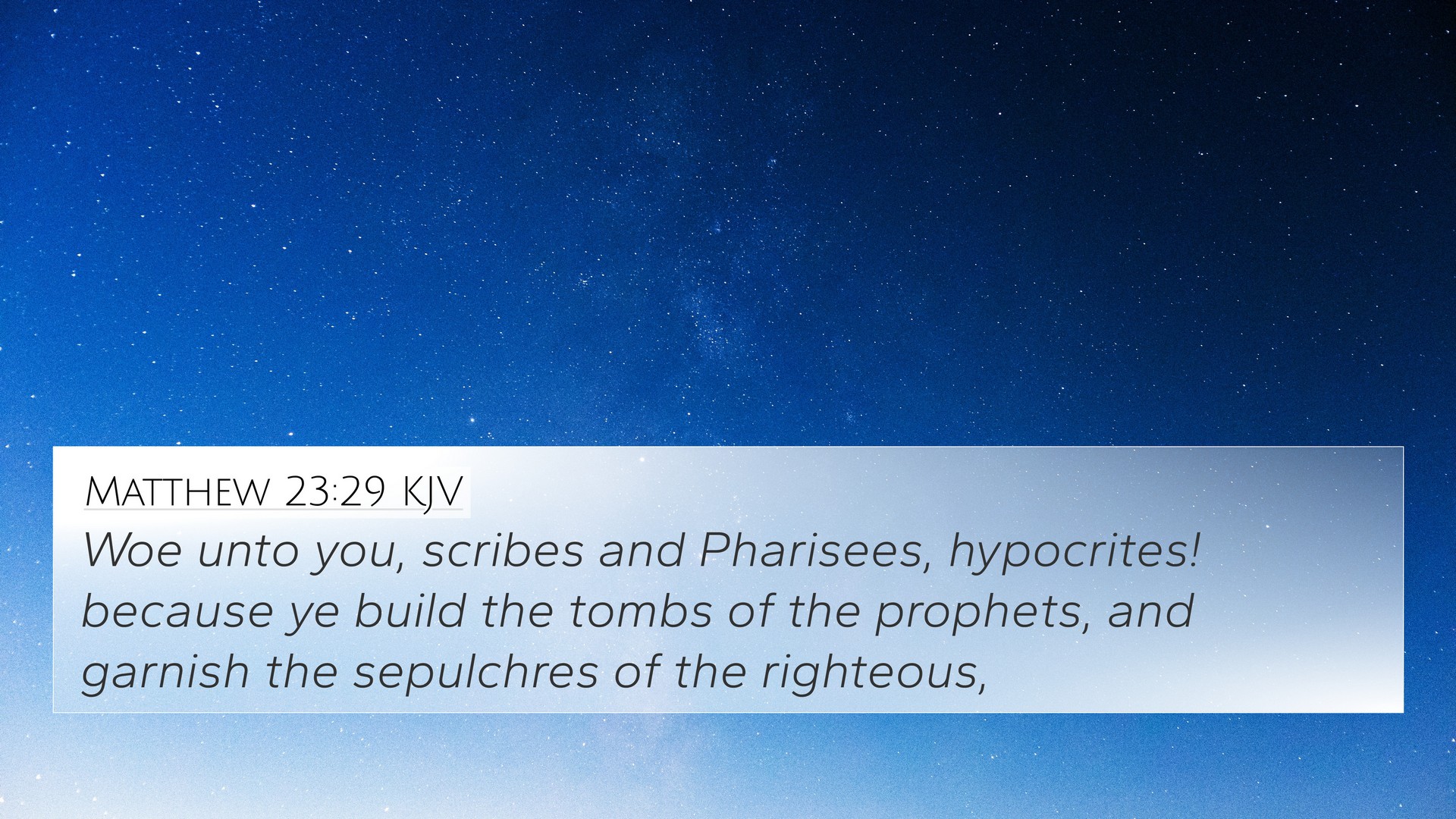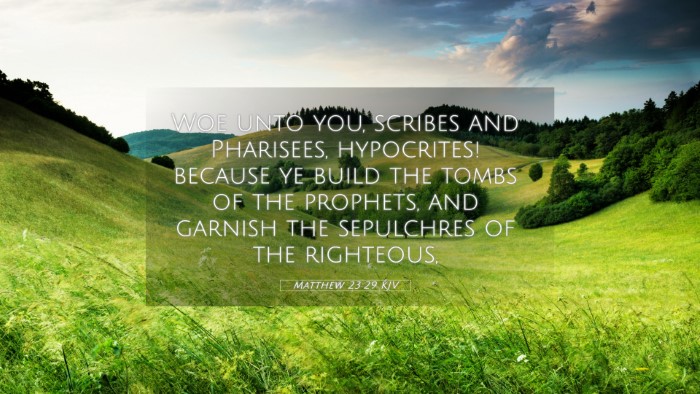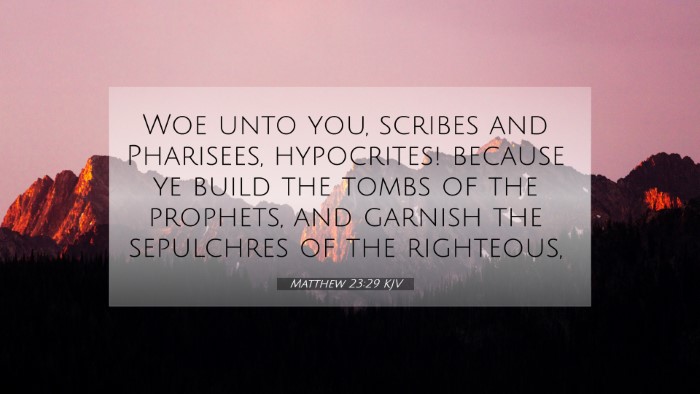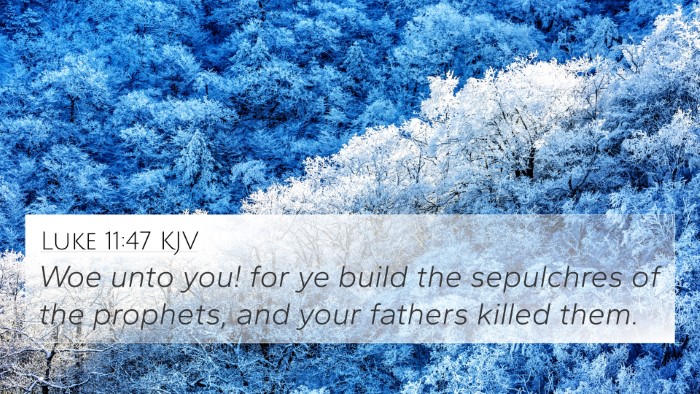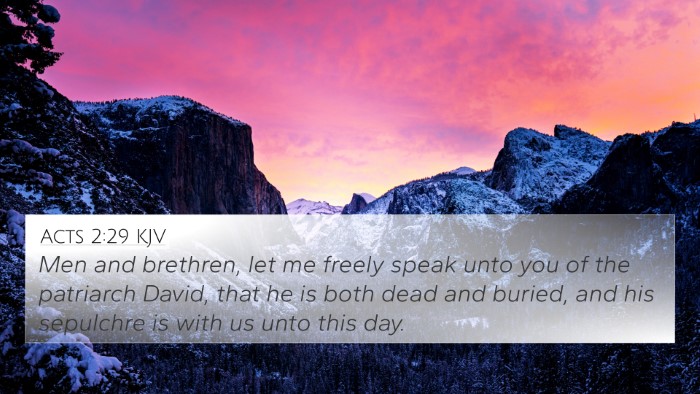Understanding Matthew 23:29
Matthew 23:29 states: "Woe unto you, scribes and Pharisees, hypocrites! because ye build the tombs of the prophets, and garnish the sepulchres of the righteous."
This verse is part of a larger discourse where Jesus rebukes the religious leaders of His time. Here is a comprehensive analysis based on insights from respected public domain commentaries.
Contextual Overview
To understand Matthew 23:29, it's important to consider the context. Jesus addresses the scribes and Pharisees, religious leaders known for their strict adherence to laws and traditions. He denounces them not just for their actions but for their hypocrisy.
Verse Meaning and Commentary Insights
-
Matthew Henry's Commentary:
Henry points out that the Pharisees, despite their reverence for the prophets of old, were guilty of the same sins that led to the persecution of these holy men. By building tombs for the prophets, they demonstrated a false piety while ignoring their teachings and the spirit of the law.
-
Albert Barnes' Notes:
Barnes highlights the irony in their actions—the Pharisees professed honor towards the prophets by beautifying their graves, yet they were the very ones who would reject and kill the true prophets sent by God. Their outward actions masked an inward corruption.
-
Adam Clarke's Commentary:
Clarke suggests that this behavior illustrates a deeper hypocrisy; these leaders presented themselves as followers of the prophets while simultaneously denying God's message through their rejection of Christ, the greatest prophet.
Thematic Connections
Matthew 23:29 prompts reflections on several critical themes in scripture, and it can be connected to various other verses that echo similar sentiments of hypocrisy, rejection of God's messengers, and the danger of religious formalism. Below are some thematic connections:
- Luke 11:47: "Woe unto you! for ye build the sepulchres of the prophets, and your fathers killed them." - A parallel statement that emphasizes the same hypocrisy.
- Matthew 5:20: "For I say unto you, That except your righteousness shall exceed the righteousness of the scribes and Pharisees, ye shall in no case enter into the kingdom of heaven." - A call for deeper, genuine faith rather than mere external observance.
- Acts 7:52: "Which of the prophets have not your fathers persecuted?" - Stephen's accusation against the Jewish leaders follows a similar theme regarding their mistreatment of God's prophets.
- John 15:20: "Remember the word that I said unto you, The servant is not greater than his lord. If they have persecuted me, they will also persecute you." - Jesus forewarns His disciples about the opposition they would face, echoing the treatment of past prophets.
- 1 Thessalonians 2:15: "Who both killed the Lord Jesus, and their own prophets, and have persecuted us..." - Reflecting the continuity of rejecting God's messengers.
- Hebrews 11:32-38: This passage speaks of the many prophets who endured suffering for their faith, presenting a stark contrast to the hypocritical honor given by the Pharisees.
- Revelation 18:24: "And in her was found the blood of prophets, and of saints, and of all that were slain upon the earth." - A broad condemnation of those who continue the legacy of persecution.
Tools for Biblical Cross-Referencing
For those interested in digging deeper into Biblical connections, here are various tools and methods for effective cross-referencing:
- Bible Concordance: A valuable resource that provides a comprehensive index of words in the Bible, enabling users to find verses based on specific keywords.
- Bible Cross-Reference Guide: Such guides outline related scriptures, providing context and thematic links.
- Bible Chain Reference: A method of linking verses through similar themes or messages, allowing for easier study across multiple scriptures.
- Cross-reference Bible Study Methods: These methods help facilitate comparative analyses between verses, enriching one’s understanding of scripture.
Conclusion
Matthew 23:29 serves as a powerful reminder of the dangers of hypocrisy in religious practice. The commentaries and cross-references illustrate how this theme resonates throughout the Bible, from the Prophets to Christ, showcasing a pattern of rejection towards God's true messengers. Understanding these dynamics encourages believers to reflect on their faith and intentions sincerely.
Further Reflection
As you explore the connections between Matthew 23:29 and other scriptures, consider how these insights can be applied personally and within the context of community worship. Engaging with the Bible in a cross-referenced manner can uncover profound truths and enhance one's spiritual journey.
